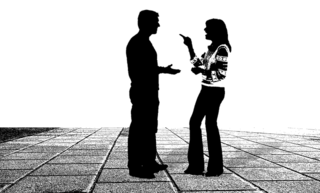Relationships
How to Add Some Spark to Your Relationships
Being "right" isn't always the right thing to do.
Posted June 9, 2018

Most of us go through the day operating as knowers. It’s as true when we don’t know as when we do, because we think that we’re supposed to know. It’s what I call our society’s “knowing paradigm” and it shapes how we see, feel and relate to ourselves and the people and things in our world. As a developmental psychologist, educator and coach, I’ve come to see how this keeps us stuck in old ways of doing things, and often keeps us distant from other people. I help people loosen the grip that the knowing paradigm has on them in all kinds of situations.
Even in our common, everyday conversations, we’re at the mercy of the knowing paradigm. Knowing what something is, whether it’s true, whether it’s right. Knowing that it’s this and not that. We think, see, feel, talk and relate in dualistic, either-or ways many times a day. Let’s take a look.
You wake up with a headache and lie in bed not wanting to get up. You must, though, so you say to yourself, “Mind over matter” or whatever your version of that maxim (which separates mind and body) is. You turn on the TV and hear that scientists claim to have discovered that shyness is genetic, not environmental. You take your child to school and learn that recess is cancelled because the children need to learn to read, not play. At work, you and your office mate get into a fight about whether Israel has a right to defend itself or the Palestinians have a right to a state of their own.
Must we choose? Are human lives and civilizations so simple that everything is one thing and not another? Intellectually, we all know the answer is no. But we’ve learned to carry on our conversations and relationships this way. And I think it harms us, keeps us from getting closer to others and from imagining new solutions.
It turns out there are ways to talk that don’t follow the knowing paradigm. If you practice it, you might create new kinds of conversations, ones that can add some spark to relationships—the spark that comes from going somewhere new together.
Here’s one way you can practice.
Your friend says something you know to be wrong about a recent event, your co-worker wants to go out after work to a bar you don’t like, your sister wants to spend a lot of money she doesn’t have on a vacation. What feels like the right thing to do in these situations is to correct the “facts,” to reject the bar choice, to tell your sister she’s a jerk. It feels right because we’ve been socialized to the knowing paradigm—in effect, we’re saying, “Knowing is what matters. And I know better.”
You might be wondering what else you can do in situations like this when there’s a difference of opinion or a disagreement or you strongly object to what someone is saying to you, either because you know it to be false or you find it hurtful or disturbing. Don’t you have to be honest and let the people know what you think and how you feel? Should you really be hiding that?
Before you answer, ask yourself these questions: “How come, right now, I need to say what I know or think? How will that be for the relationship I have with this person?” And if you do this, other ways to respond just might occur to you. Maybe you’ll let yourself be curious (“Gee, tell me more about how come you like that place so much.”) Maybe you’ll take it as an opportunity to explore your differences (“We agree on so many things and here’s a situation we see so differently!”) Maybe you’ll give you and your conversational partner a new challenge (“How can I support you even though I disagree with what you want to do?”). Maybe you’ll …
When you’re talking with loved ones, friends, co-workers and even strangers, you can learn to hear offers, instead of hearing opinions or truths or falsehoods and to create opportunities instead of both of you holding your ground. What’s even better is you can actually learn to hear both at the same time! In improv as a performance technique done by actors and comedians, it’s often said that you have to accept what someone says as “true” in order for the scene to work. I’ve never been comfortable with that formulation or that rule. I believe you can accept it without the truth part IF you accept that something doesn’t have to be either “this” or “that” but that it can be both what it is and also something else. In other words, if you reject the dualism of the knowing paradigm. For, off the theatrical stage in life’s activities, including most importantly in the conversations we create, what someone says might well be “false” or abhorrent to you and be an offer at the same time. One doesn’t preclude the other, since everything is what it “is” and other than what it “is.” It’s the primacy of knowing and it insistence on “either/or” that makes it so hard sometimes to go somewhere new with the people in our lives.
You can read more about the knowing paradigm and how recognizing it will help you in The Overweight Brain: How our obsession with knowing keeps us from getting smart enough to made a better world. Available from Amazon.


